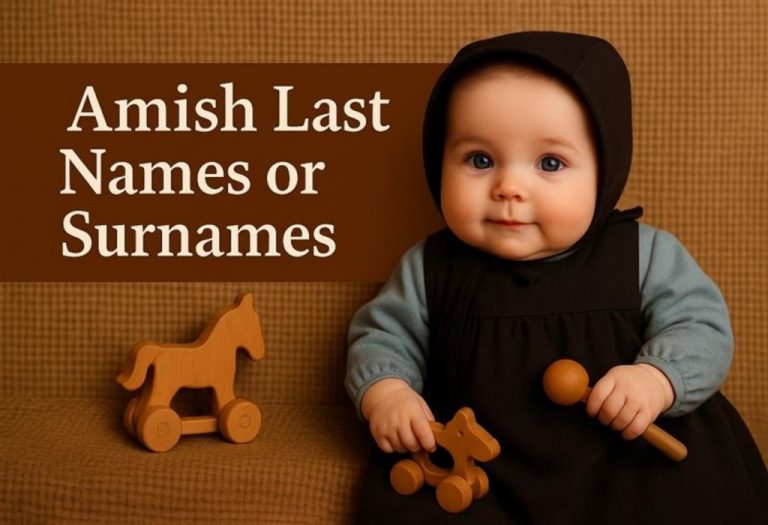100+ Amish Last Names or Surnames With Meanings
If you’ve ever spent time in rural Pennsylvania, Ohio, or Indiana, you might have noticed how certain surnames seem to appear over and over—names that carry a quiet dignity and deep cultural roots. These names belong to the Amish, a close-knit community known for their simplicity, faith, and strong sense of family history. Exploring Amish last names reveals more than just words on paper—it uncovers a living heritage, where identity is shaped by ancestry and belief. Understanding where they come from gives us a glimpse into how the Amish preserve connection, humility, and belonging in a world that often rushes past such things.
Unique Amish Surnames
Every Amish surname holds memories of old journeys, family faith, and a life close to the land. Here are twenty unique Amish names in simple form and meaning.
1. Albrecht: Connected to German heritage, this name represents noble character and bright spirit. Families with this surname are known for honesty, compassion, and the value they place on community ties.
2. Blauch: Sometimes spelled Blough, this name means “blue” or “pale.” It is one of the oldest Amish surnames, dating to Swiss origins, symbolising peace and simplicity.
3. Bonham: Though less common, Bonham appears in some Mennonite-Amish records. It means “good home,” aligning with Amish family-centred values.
4. Detweiler: A name revealing valley dwellers, it describes Amish families who value simple rural life, close to rolling hills, farmland, and the ever-present rhythm of seasonal change.
5. Erb: From the Middle High German word for “heir” or “inheritance.” Erb families symbolise generational faith and continuity, core values in Amish culture.
6. Gingerich: This unique name traces to leadership and resilience, referencing ancestors who were battle-wise, guiding their communities with wisdom and serving as steadfast examples for others.
7. Gunden: An Amish surname of German origin meaning “battle” or “warrior.” While the name sounds strong, it reflects spiritual endurance rather than conflict — a key Amish ideal.
8. Hofer: A classic Swiss surname meaning “farmer” or “landholder.” Hofer families are closely tied to agriculture — a foundation of Amish livelihood.
9. Huyard: means one who dwells in high places, symbolising families who lived on hills and faced life’s challenges with courage, faith, and enduring togetherness.
10. Hostetler: points to settlers from high ground, suggesting strong family ties, stability, and a sense of belonging built across generations.
11. Kurtz: identifies families of traders and merchants. These ancestors helped shape the Amish way of life, bringing honesty and fair dealings to every community gathering.
12. Keim: This name comes from the German word for sprout or seedling, hinting at family values rooted in growth, renewal, spiritual hope, and faith in new beginnings every spring.
13. Livingood: A uniquely Americanised Amish surname, Livingood is derived from Levingut or Lieben Gut, meaning “live well” or “good life.” It reflects the Amish ideal of living a simple, moral, and meaningful life close to God and community.
14. Mast: Derived from the word for nourishment, Mast ancestors shared food and kindness with their neighbours, reinforcing traditions of hospitality and generosity across Amish communities.
15. Mishler: A traditional Amish surname of Swiss origin, Mishler means “from Michel” or “Michael’s family.” It represents faithfulness and spiritual strength within Amish tradition.
16. Smucker: Derived from the Swiss-German word schmucker, meaning “ornamental” or “neat,” Smucker families are known for honesty and strong work ethics.
17. Schmucker: With origins as a jewellery maker or craftsman, Schmucker families are known for their creative talents and an ability to make something beautiful from ordinary materials in daily life.
18. Stoltzfus: Stoltzfus stands for proud foot or firm stance, signifying determined families who stood strong during migration, often becoming pillars of their Amish communities through hard times.
19. Tice: A short form of Theiss (from Matthias), Tice means “gift of God.” Found among some Amish and Mennonite families, it reflects deep faith and gratitude for divine blessings.
20. Yoder: One of the oldest surnames, Yoder comes from a Swiss word for warrior, celebrating courage, loyalty, and the ability to endure challenges together as a close-knit community.
Common Amish Last Names
Many Amish last names have been passed down through generations, reflecting the community’s history and roots. These names often come from occupations, places, or personal qualities, telling quiet stories of hard work and faith.
1. Bowman: Meaning “archer” or “bow maker,” Bowman families are known for their honesty, craftsmanship, and gentle living.
2. Bontrager: Known for being reliable messengers in Amish history, these families valued staying connected with loved ones and played important roles in sharing news among rural settlements.
3. Burkholder: A name meaning fortress keeper, it describes people who offered protection, strength, and resilience to their families and communities, always prioritising safety in daily life.
4. Fisher: Drawing from deep ties to land and water, Fisher families were known for living close to nature, finding peace, and practising stewardship in the Amish countryside.
5. Hershberger: Hershberger carries the image of deer in the mountains, representing gentle spirits, an appreciation of natural beauty, and the quiet patience of living on peaceful rural hills.
6. Hershey: Meaning one living in a high place, this surname describes individuals who faced challenges with optimism, balancing faith and steadfastness while working on raised fields and farmlands.
7. Hersch: Families settled on high ground, maintaining steady connections with land and heritage, building homes that fostered togetherness and a sense of security for each generation.
8. Kline: As merchants and traders, families played vital roles in Amish life, bringing fairness and trust to every transaction and supporting neighbours through honest business practices.
9. King: Often associated with leadership and responsibility, the King name represents those who were looked up to in their Amish communities for their wisdom, guidance, and generosity.
10. Lambright: Reflecting German roots meaning bright land, Lambright families are known for nurturing farmland, encouraging hope, and promoting stability and care throughout their rural communities.
11. Lehman: This name highlights service and humility, with Lehman families quietly building homes, contributing to their communities, and always lending a helpful hand to friends and family.
12. Leichty: A Swiss-German surname derived from leicht, meaning “light” or “gentle.” Leichty families are admired for their kind, calm, and modest nature.
13. Miller: As the most recognised Amish surname, Miller speaks of everyday labour and self-reliance in grinding grain, underscoring the value of steady work and simple living on the farm.
14. Stoll: From the German stolz, meaning “proud” or “dignified.” Stoll families settled early in Pennsylvania and Indiana, embodying quiet dignity and faithfulness.
15. Schlabach: Meaning those from low meadowlands, this name describes families who cherished peace and stability, found comfort in quiet farmland, and kept traditions alive with gentle routines.
16. Schwartz: A simple yet classic German name meaning “black.” Among Amish, Schwartz families are often linked to the Old Order groups that maintain strong cultural boundaries.
17. Tinstman: A lesser-known Amish surname of Germanic origin, Tinstman likely refers to someone who worked with tin — a “tinsmith.” It symbolises craftsmanship and the Amish respect for skilled trades.
18. Weaver: Reflecting creativity and diligence, Weaver families became known for skilled handiwork, making practical and beautiful goods that strengthened Amish households and local communities.
19. Coblentz: Derived from an old Swiss word for warrior, Yoder families are admired for their loyalty, determination, and ability to withstand hardships while staying united as a close-knit group.
20. Zook: Less common yet meaningful, the Zook name is tied to Swiss Anabaptist origins, symbolising resilience, courage, and the enduring nature of Amish heritage through centuries of change.
Popular Amish Last Names
Amish surnames carry quiet strength, faith, and family history. Below are a few unique Amish last names –
1. Allgyer: A Swiss-rooted Amish surname reflecting honesty, steady work, and trust. Often linked with farming families who value humility, church life, and close community bonds across generations.
2. Beachy: Known among Old Order communities. Suggests gentle manners, cooperation, and peace. Families with this name often balance tradition, craftsmanship, and strong kinship within rural settlements.
3. Borkholder: Signals diligence and modest means, with deep ties to agriculture and woodcraft. Families emphasise mutual aid, integrity, and raising children within simple, faith-centred homes.
4. Byler: An established Amish name associated with reliability and careful handiwork. Bylers often value plain living, church commitment, and teaching practical skills to the next generation.
5. Chupp: Frequently connected with capable builders and farmers. The name conveys dependability, thrift, and fellowship, pointing to families who keep traditions while supporting neighbours during daily needs.
6. Diener: Of German origin meaning “servant” or “attendant.” Diener families embody the Amish principle of service to others and community support.
7. Eash: Short, warm, and memorable. Eash families are known for harmony, careful stewardship of land, and guiding children toward modest dress, honest business, and faithful church membership.
8. Glick: Tied to capable artisans and shopkeepers. Glick suggests creativity practised within plain limits, with families emphasising fairness, patient training, and honouring elders’ stories and convictions.
9. Helmuth: A respected surname reflecting sincerity and perseverance. Helmuth homes often prize hard work, careful saving, and generous hospitality to travellers, ministers, and extended family during gatherings.
10. Hochstetler: Historic among Amish and Mennonite lines. Evokes courage, forgiveness, and survival stories from early America. Families honour ancestors through careful living, hymn singing, and firm communal ties.
11. Kemp: Simple and sturdy. Kemp families typically model practical wisdom, attentive parenting, and neighbourly help, blending farming routines with small trades that serve local church districts.
12. Lengacher: Swiss-origin name suggesting perseverance and teamwork. Lengacher households often excel at dairy work and quilting, valuing thrift, punctuality, and gentle instruction rooted in scripture and tradition.
13. Moyer: An Americanised version of Meier or Meyer, meaning “steward” or “bailiff.” Moyer families are often associated with leadership and integrity within Amish-Mennonite life.
14. Otto: A plain surname linked to steadiness and careful judgement. Otto families often run modest shops or farms, teaching children responsibility, gratitude, and respect for longstanding Ordnung.
15. Raber: Warm and approachable. Raber families are remembered for helpful spirits, careful budgeting, and singing together at home, keeping peace with neighbours and honouring church teaching through action.
16. Slabaugh: Conveys craftsmanship and honest trade. Slabaugh households typically pass down woodworking skills, emphasise modest dress, and support community projects that strengthen friendship, accountability, and shared responsibilities.
17. Spicher: Suggests quiet strength and reliability. Spicher families often steward small farms, prioritise careful record-keeping, and guide youth toward patient learning, safe travel, and faithful adult baptism.
18. Swartzentruber: Among the oldest Amish lines. Indicates strict simplicity, strong Ordnung observance, and deep devotion to family worship, mutual aid, and working the land with humble tools.
19. Wagler: A steady surname reflecting togetherness and resilience. Wagler homes value frugality, respectful speech, and teamwork during harvests and raisings, keeping traditions alive without unnecessary attention.
20. Yutzy: A well-known Amish surname symbolising faith, honesty, and endurance. Yutzy families often focus on farming, teaching, and maintaining unity, showing quiet strength in both spirit and work.
Cool Amish Surnames
Every Amish name holds quiet strength, faith, and family history. Below is an Amish surnames list of twenty cool and meaningful names written in a simple, natural tone.
1. Alderfer: A respected Amish name representing steadiness, cooperation, and faith. Families with this surname are known for dependable work ethics and strong community-centred living rooted in humility.
2. Brenneman: This name reflects devotion and kindness. Brenneman families are admired for balancing simplicity with hard work, raising children with respect, and preserving deep spiritual connections.
3. Christner: A name tied to integrity and quiet leadership. Christner families are thoughtful, honest, and often seen guiding community gatherings with calm, steady wisdom and faithfulness.
4. Croghan: Though rare, Croghan (possibly from Kroghen or Krogan) appears among converted Mennonite-Amish lines. The name may derive from the Gaelic for “rock” — symbolising steadiness and faith.
5. Ebersol: Represents peaceful hearts and creative minds. Ebersol families often express faith through skilled handiwork, modest lifestyles, and a lasting devotion to family and fellowship.
6. Esh: Simple yet meaningful. Esh families are admired for their humble nature, kind spirit, and strong focus on unity, modest living, and harmony with others.
7. Gindlesperger: A unique Swiss-German name meaning “from the Gindel mountain.” Families with this surname often trace their ancestry to early Anabaptist regions in Switzerland.
8. Hosterman: Carries the essence of trust and calm strength. Hosterman families are dependable, kind-hearted, and respected for generosity and dedication to helping those around them.
9. Kanagy: Reflects grace and quiet confidence. Families embody peaceful faith, skilled craftsmanship, and a disciplined approach to maintaining harmony within both home and community.
10. Luginbill: A Swiss name meaning “lookout hill” or “hill dweller.” Luginbill families have a long Amish and Mennonite heritage, known for their steady, grounded faith.
11. Lantz: Represents steady hands and patient work. Lantz families often teach younger generations the value of humility, honesty, and perseverance in faith and farming.
12. Mullet: A name linked to creativity and discipline. Mullet families show strength through simplicity, balancing hard labor, family bonds, and gratitude in their daily lives.
13. Nisley: Symbolises peace and thoughtful living. Nisley families maintain quiet discipline, honesty, and faith-centred routines that promote cooperation and respect within their communities.
14. Overholt: Reflects leadership and courage. Overholt families guide others with fairness, compassion, and faith, emphasising teamwork and loyalty in maintaining their simple Amish lifestyle.
15. Plank: Represents stability and hard work. Plank families are known for carpentry, farming, and honest effort, shaping meaningful lives rooted in shared faith and responsibility.
16. Ropp: A calm yet strong name. Ropp families uphold integrity, kindness, and devotion to faith, teaching younger generations through gentle words and consistent example.
17. Sensenig: Of Swiss-German origin meaning “sensible” or “wise.” Sensenig families are known for scholarship and leadership within Amish-Mennonite congregations.
18. Stutzman: Reflects trustworthiness and inner strength. Stutzman families live peacefully, showing dedication to honest work, family support, and service to church and community.
19. Tobe: A rare Amish surname, Tobe is derived from Tobias, a Hebrew name meaning “God is good.” The name appears among Amish families in Ohio and Indiana and reflects humility and devotion.
20. Wenger: Denotes peace and reliability. Wenger families are steady and faithful, offering guidance, compassion, and humility that strengthen their communities across generations.
Pennsylvania Amish Last Names
Many Amish families in Pennsylvania carry surnames that have been passed down for centuries. Each name tells a story of faith, humility, and strong family roots.
1. Beiler: A traditional Pennsylvania Amish name representing honesty, peace, and faith. Beiler families are often farmers known for patience, dedication, and devotion to their community.
2. Brubaker: From the Swiss word meaning “brook near the hill,” Brubaker families are early Pennsylvania settlers, admired for their faithfulness and quiet dignity.
3. Eashman: Known for kindness and reliability. Eashman families uphold traditions of careful living, humility, and love for their land and the church they serve.
4. Graber: A name reflecting strength and togetherness. Graber families value loyalty, compassion, and the steady effort that builds both homes and meaningful relationships.
5. Hartzler: From the German Hart (“strong” or “brave”). Hartzler families symbolise steadfastness, devotion, and loyalty to faith — qualities central to Amish life.
6. Hooley: A historic Amish name tied to courage and forgiveness. Families cherish their heritage, showing resilience and compassion through simple, faithful living.
7. Kauffman: Represents reliability and grace. Families live humbly, often known for craftsmanship, farming skills, and a deep trust in God’s plan for life.
8. Kennel: A Swiss-German surname derived from Könel or Kohnel, meaning “bold” or “brave.” Amish Kennel families often embody perseverance and faith through community devotion.
9. Knepp: A peaceful and kind-hearted name. Knepp families are admired for generosity, diligence, and maintaining a warm, supportive spirit within their neighbourhoods.
10. Lapp: Carries a quiet strength and simplicity. Lapp families value honesty, hospitality, and hard work, often forming the foundation of close-knit Pennsylvania settlements.
11. Miller: Among the most recognised Amish names. Miller families are respected for humility, hard work, and their steady role in farming and community building.
12. Peachy: A name reflecting warmth and kindness. Peachy families are gentle, faithful, and known for helping others while keeping traditions alive across generations.
13. Schlabach: Represents deep-rooted faith and discipline. Schlabach families maintain strong moral values, focusing on church life, honest labour, and raising children with devotion.
14. Swarey: A variant of Schwarey or Swarr, Swarey comes from a Swiss word meaning “black” or “dark.” The name is particularly common among Old Order Amish communities.
15. Troyer: A name that stands for unity and perseverance. Troyer families live with gratitude, faith, and simplicity, keeping traditions alive while nurturing future generations.
Catchy Amish Last Names
Some Amish names stand out not just for their sound but for the values they represent. Here’s a warm look at the most common Amish last names, each carrying a story of faith and simplicity.
1. Bender: A name that reflects determination and balance. Bender families are known for their patient work, calm attitude, and faith that guides their daily choices.
2. Blank: Represents humility and straightforward living. Blank families often work with their hands, finding purpose in farming, building, and keeping life peaceful and simple.
3. Clymer: A thoughtful name linked to gentle leaders. Clymer families are known for kindness, fairness, and an ability to bring people together through quiet strength.
4. Duerksen: A rare Amish surname from Low German roots, meaning “son of Dierk” or “Theodor.” It represents family heritage and continuity through generations.
5. Eicher: Reflects patience and warmth. Eicher families live modestly, teaching their children to appreciate honesty, gratitude, and the beauty of small, faithful moments in life.
6. Gerber: A cheerful, trusted surname. Gerber families are often active in farming and trade, known for their kindness, humour, and strong belief in helping others.
7. Helm: A name tied to longstanding Amish roots. Families are admired for their steadiness, humility, and respect for traditions passed down through generations.
8. Kropf: Simple yet sturdy. Kropf families value faith and hard work, keeping strong bonds within the church and caring deeply for those around them.
9. Lindt: This Swiss surname means “lime tree.” For Amish families, Lindt symbolises peace and stability — much like the tree itself, which provides shade, shelter, and balance in nature.
10. Moser: Of Swiss-German origin, Moser means “one who lives near a bog or mossy area.” Many Amish and Mennonite families carry this name, symbolising rootedness and a deep connection to the land.
11. Millerich: A less common but charming name. Millerich families are respected for their honesty, calm spirit, and genuine warmth toward friends, neighbours, and visitors.
12. Schrock: Reflects perseverance and faithfulness. Schrock families are deeply devoted to tradition, valuing simplicity, patience, and the importance of living with purpose and gratitude.
13. Shetler: A soft-sounding name tied to family care and integrity. Shetler families are gentle, hardworking, and committed to serving others through faith-filled actions.
14. Swartz: A short, strong surname. Swartz families are known for practical wisdom, grounded lifestyles, and the ability to adapt while holding firm to their beliefs.
15. Wengerd: Carries the meaning of trust and teamwork. Wengerd families often build lasting friendships and stable homes through shared work, faith, and genuine kindness.
Amish last names are more than identifiers; they carry values, history, and a way of life rooted in simplicity and strength. In every Amish surname, there’s a glimpse of a life centred on peace, purpose, and devotion.
Also Read:
Spanish Last Names or Surnames
Common Dominican Last Names or Surnames
Mexican Last Names or Surnames with Meanings
Roman Last Names or Surnames & Their Meanings













.svg)


















